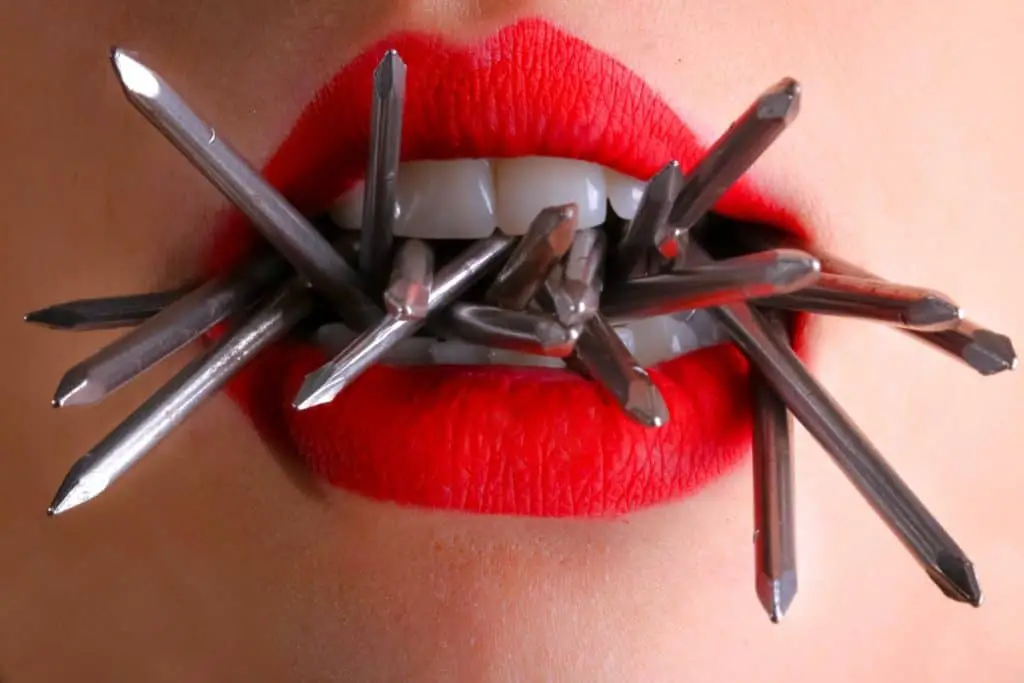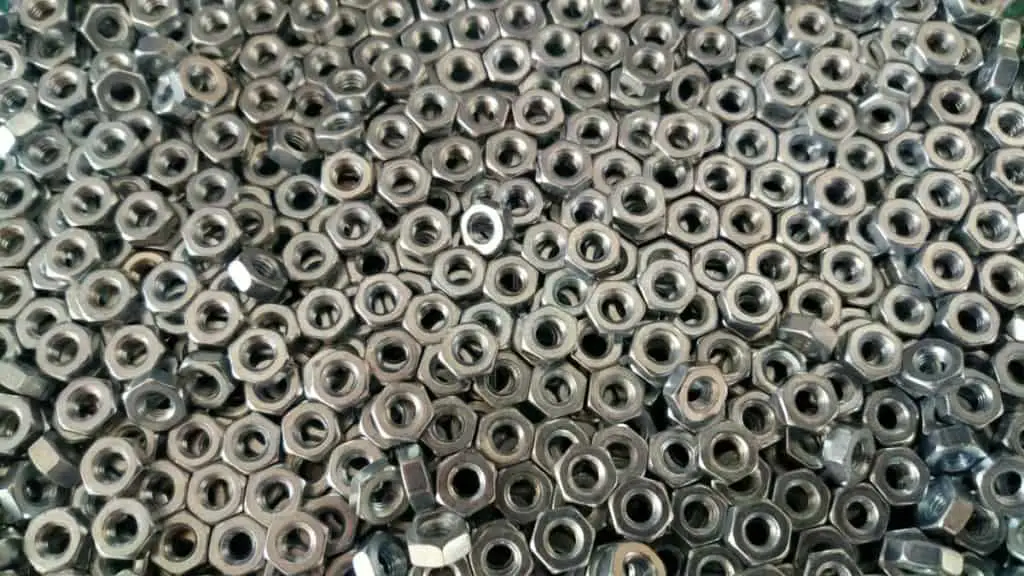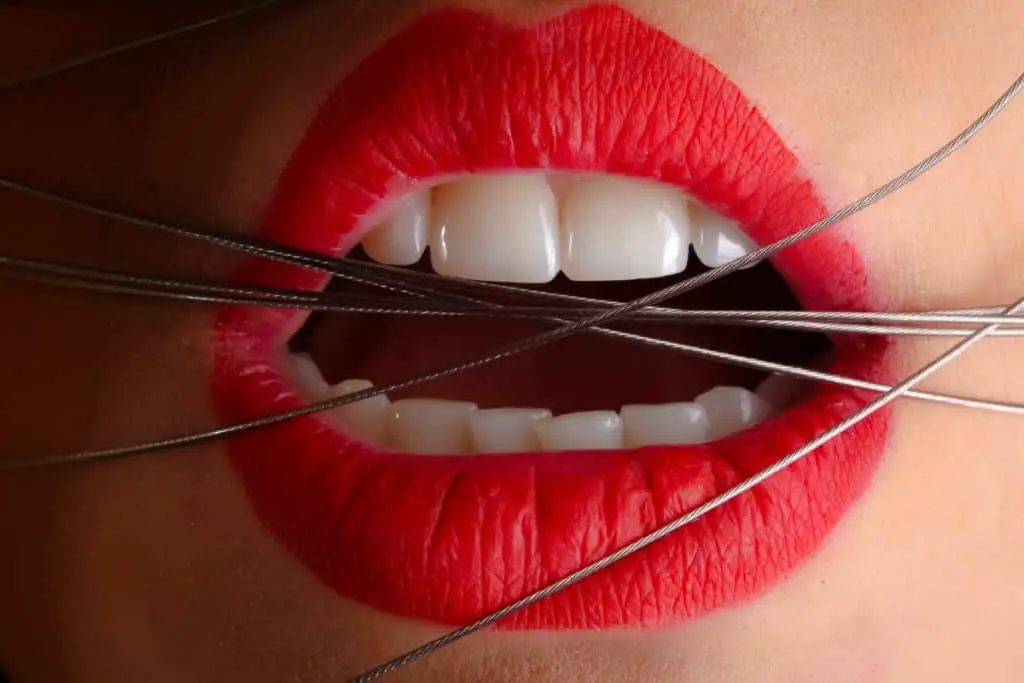
If you are interested in finding out what happens when you decide to eat metal then you’ve come to the right article.
As, in this article, you’ll find the exact answer to this question and after you’ve read the answer to the main question then I’ll also cover the answers to a few more closely related questions to extend your knowledge further.
I hope that you learn from this article!
What happens if you eat metal?
Eating pieces of metal or metal objects can damage your teeth, esophagus, stomach, and other parts of the gastrointestinal tract.
Metal with sharp or jagged edges will likely cut the esophagus, causing bleeding and possibly an infection.
If you were able to swallow a jagged piece of metal without choking or damaging your esophagus, it could continue to pose a threat as it works its way through the digestive system.
Of course, some small metal objects can be swallowed without causing a problem.
For example, children who swallow small coins are usually able to pass them after a few days.
What happens if you eat sodium metal?
Although sodium, which is found in many foods, is an essential nutrient that regulates muscle action, ingesting too much of it is toxic and can potentially be lethal.
Sodium is a soft metal.
In its isolated and purified state, it is a highly flammable and unstable substance.
When mixed with water or even moist air, sodium produces hydrogen gas.
Sodium chloride, or table salt, is a naturally occurring compound that has equal parts sodium and chloride ions.
If an average-sized adult consumes more than a couple of tablespoons of salt they will experience hypernatremia or salt poisoning.
Hypernatremia, or high levels of sodium in the blood, causes cells to lose water through the process of osmosis.
Initially, someone who has toxic levels of sodium will experience profound thirst.
As the condition worsens, their heart rate will elevate, and they may experience muscle spasms or seizures.
If the person is not rehydrated, it can lead to coma and death.
When people drink seawater, which has high levels of salt, they experience hypernatremia.
What happens if you eat rust metal?
Rust is produced when iron oxidizes.
Cast iron pans quickly develop rust spots if they are not properly seasoned and oiled.
In most cases, if you ingest a small amount of rust you will not experience any ill effects.
However, some people have a rare hereditary condition known as hemochromatosis, which causes ingested iron to be deposited and retained in the tissues of their organs.
This can cause liver damage.
What happens if you eat potassium metal?
Potassium is a very soft metal, which is an essential nutrient.
It is also among the most plentiful elements in the human body.
Potassium naturally occurs as a component in certain salts, but it only exists in its pure form when artificially isolated.
Pure potassium is highly unstable.
When exposed to air, it will create potassium peroxide.
When this is mixed with water, it produces hydrogen gas.
Potassium hydroxide, which is commonly known as lye, is an extremely caustic chemical that is used to make soaps.
It is also used in industrial food manufacturing as a stabilizer and thickener.
Although potassium hydroxide is safe to consume in very small amounts when properly mixed with other ingredients, eating or even touching concentrated lye can cause severe chemical burns.
When lye comes into contact with water, including moisture on your skin or in your mouth, it causes an immediate chemical reaction.
Ingesting undiluted lye in any quantity will cause profound damage to the esophagus and GI tract.
What happens if you eat metal dust?
Eating or breathing dust with high concentrations of heavy metals such as lead, mercury, or arsenic results in heavy metal poisoning.
Symptoms vary depending on the type of metal that is consumed.
Mercury and lead poisoning cause numbness in the hands and feet, as well as cognitive impairments such as memory loss.
Arsenic poisoning also causes numbness, but it characteristically results in more obvious and observable symptoms such as swelling and lesions on the skin.
What happens if you eat metal in food?
Eating a metallic object in your food can cause damage to your esophagus, stomach, and other regions within the gastrointestinal tract.
Any sharp edges can lacerate or puncture organ tissue, resulting in bleeding or hemorrhaging, and possibly infection.
Biting or chewing on metal objects can damage your teeth.
What happens if you eat metal shavings?
It is very dangerous to eat metal shavings since they have sharp, jagged edges that can tear or cut the tissues in your mouth, throat, or stomach, resulting in ulcers, bleeding, and possible infection.
The gastric fluid in your stomach is unable to break down metal shavings, so your body will attempt to pass them through the lower digestive system where they once again can result in cuts or punctures, as well as intestinal blockage.
What happens if you eat metal from a can?
Metal cans are typically made from aluminum.
Eating large pieces of aluminum or even small shavings will likely result in tears or punctures to organ tissues throughout your gastrointestinal tract.
When swallowing, the jagged edges of a piece of metal can cut or become lodged in your esophagus, causing bleeding and choking.
As the metal passes through your stomach and the rest of your GI tract, it can cause ulcers and lacerations that can become infected or result in severe blood loss.
Finely ground Aluminum is a toxin that attacks the nervous system.
Symptoms of aluminum poisoning include muscle and bone pain, cognitive impairment, and seizures.

What happens if you eat a metal nail?
Nails or other small metal objects such as coins often pass through the gastrointestinal tract without causing damage.
However, any foreign object, particularly a metal one, can cut or perforate organ tissue, resulting in ulcers or bleeding that can then become infected.
Moreover, a nail can become lodged, resulting in intestinal blockage.
What happens if you swallow a piece of metal?
A small, smooth piece of metal will likely pass through your GI tract without a problem.
However, larger objects or irregularly shaped pieces of metal can cause intestinal blockage.
Any piece of metal that has sharp edges can cut or rip your organ tissues, resulting in bleeding and infection.
What happens if you swallow a piece of metal from braces?
In most cases, swallowing a small piece of metal from your dental braces will not cause a problem.
While larger pieces of metal can cause lacerations or perforations to the tissues in the esophagus, stomach, or intestines, a small piece from your braces will probably not do so.
Typically, foreign objects like this are passed within a week.
If you show any signs of infection, such as fever or chills, or if you experience abdominal discomfort, you should seek medical attention.
Can you eat metal?
Although you can eat or swallow metal, you shouldn’t do so.
Chewing or biting metal will damage your teeth and swallowing it is a choking hazard.
It can also cause lacerations or tears to the organs that make up your GI tract.
Any cuts or punctures can lead to internal bleeding and infections.
Can you digest metal?
The gastric fluid in your stomach is unable to break down a piece of metal that is large enough for you to see.
Although your body can digest the trace amounts of metals found in foods, it is unable to work on metal objects.
Small and smooth metal objects will likely pass through your GI tract without causing a problem, but any relatively large or irregularly shaped object can easily become lodged in the GI tract.
Moreover, any sharp edges can result in tissue damage and bleeding.
Is it ok to eat metal?
Because of the numerous risks associated with eating metal, it is not ok to eat metal.
Attempting to consume a metal object can result in damage to your teeth, throat, stomach, or intestines.
Can swallowing metal be lethal to humans?
Attempting to swallow metal can be lethal since it can lead to choking, organ damage and failure, internal bleeding, and systemic infection.
So, it is necessary to skip swallowing metal by all means.
Can goats eat metal?
Although goats have a reputation for being able to eat just about anything, like humans, they cannot safely eat metal.
So, you shouldn’t accidentally feed goats small amounts of metals as this can be lethal to them.
Can termites eat metal?
While termites can eat wood and other cellulose material, they cannot eat metal.
So, you won’t ever find termites eating metal.

Can rats eat metal?
Rats have open-rooted incisors, which continue to grow throughout their life.
Moreover, their jaws are very powerful.
Although they cannot digest metal any more than a human can, rats can attempt to do so, particularly if they find that chewing on it helps wear down their teeth.
Can dogs eat metal?
Like humans, dogs are unable to safely eat or digest metal.
So, dogs cannot and shouldn’t eat metal.
Why does my dog eat metal?
If your dog often tries to eat metal then this may be a sign of malnutrition.
Iron or other deficiencies are known to cause dogs and other animals to develop pica, or a desire to eat non-food items.
How do I know if I swallowed metal?
Immediate signs that you may have swallowed metal include gagging, an inability to swallow, and trouble speaking or breathing.
Drooling and vomiting may occur as your body attempts to reject a foreign substance.
If you suspect that you have completely swallowed a piece of metal then be on the lookout for any signs of abdominal discomfort as well as blood in your saliva or stool.
What are the symptoms of swallowing metal?
Symptoms that someone has recently ingested metal can include choking, vomiting, drooling, and labored breathing.
If he/she swallowed a metal object a while ago then it may be working its way through his/her GI tract.
Symptoms to watch out for include stomach or abdominal pain, difficulty breathing, constipation, and bloody stool.
